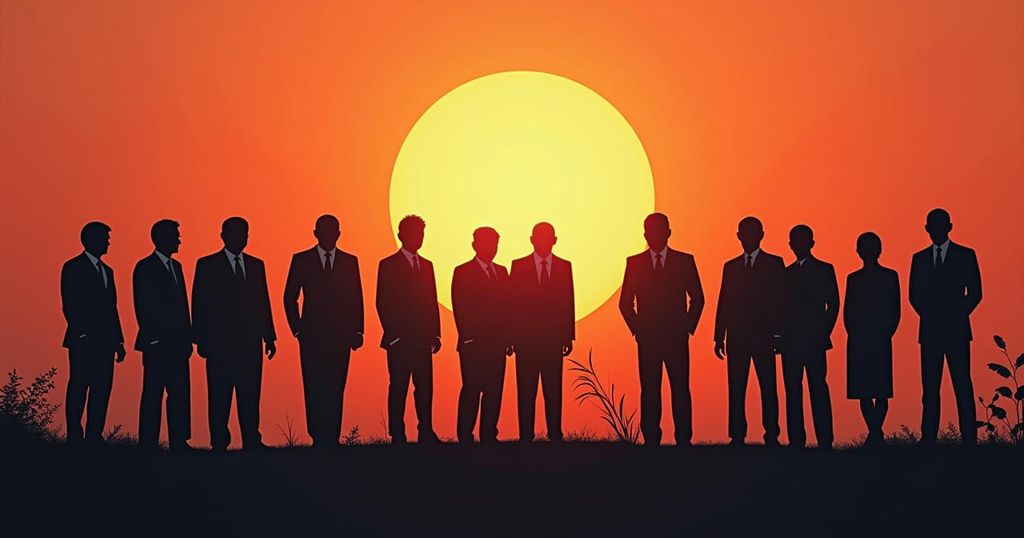Southeast Asian Leaders Gather in Laos to Address Myanmar Crisis and South China Sea Disputes
Southeast Asian leaders met in Vientiane, Laos, to discuss crucial issues including the Myanmar crisis and South China Sea disputes. New leaders from several countries participated, marking a significant approach to regional governance in light of ongoing humanitarian and territorial challenges. While discussions may foster dialogue, substantial resolutions remain uncertain due to diverging national interests and external influences.
Southeast Asian leaders convened in Vientiane, Laos, on Wednesday for an annual summit primarily aimed at addressing the enduring civil conflict in Myanmar and the escalating territorial disputes in the South China Sea. The Association of Southeast Asian Nations (ASEAN) summit will also feature discussions with global powers, including China, the United States, and Russia, which are vying for influence within the region. The forum’s schedule suggests that regional leaders will comment on the increasing violence across the Middle East, although Southeast Asia has so far only experienced indirect ramifications. Historically, ASEAN’s clout has been somewhat marginalized even among its own member states; nevertheless, the summit serves as a significant platform for communication among superpowers engaging with Southeast Asia. Representatives from the ten ASEAN member states—namely Indonesia, Thailand, Singapore, the Philippines, Vietnam, Malaysia, Myanmar, Cambodia, Brunei, and Laos—will engage in discussions with dialogue partners from other regions, including Japan, South Korea, India, and Australia, covering a wide array of subjects from the economy to climate change and energy issues. This year marks the inaugural participation of several new national leaders, notably Thailand’s Paetongtarn Shinawatra, the youngest leader in the bloc at 38, and Singapore’s Prime Minister Lawrence Wong, who succeeded Lee Hsien Loong this past May. Vietnam’s President To Lam, who also took office recently, will be represented by Prime Minister Pham Minh Chinh. Indonesia’s President Joko Widodo will not attend, delegating Vice President Ma’ruf Amin as he prepares to transition power to his successor, Prabowo Subianto. Moreover, Japan’s newly appointed Prime Minister Shigeru Ishiba will embark on his first foreign visit at this summit. During preliminary statements, Paetongtarn emphasized the urgency of addressing the Myanmar crisis, describing it as an “extremely important issue.” Since the military’s ousting of Aung San Suu Kyi’s elected government in February 2021, the humanitarian situation in Myanmar has drastically deteriorated. Despite the junta’s agreement to an ASEAN peace framework advocating a ceasefire, violent clashes persist against pro-democracy forces and ethnic groups, claiming nearly 6,000 lives thus far. Myanmar’s representation at the summit includes its Foreign Ministry permanent secretary, Aung Kyaw Moe, marking the first high-level attendance in three years, following ASEAN’s previous prohibition of political figures from Myanmar attending the meetings. Analysts, such as Lina Alexandra from Indonesia’s Centre for Strategic and International Studies, suggest that allowing a senior diplomat to participate may indicate ASEAN’s increasing fatigue in addressing the crisis, limiting the potential for substantial progress on this matter. Additionally, significant discourse is anticipated concerning maritime clashes between ASEAN countries and China in the South China Sea, a vital global trade route. Vietnam, the Philippines, Malaysia, and Brunei all assert claims that overlap with China, which has adopted an aggressive stance over its claims in the area. The Philippines has seen heightened tensions, particularly after incidents where Chinese vessels used water cannons against Filipino forces, contradicting a prior agreement aimed at reducing confrontations. Vietnam has recently reported assaults on its fishermen within the disputed Paracels Islands, asserting violations of its sovereignty. While the summit is expected to address such disputes openly, expectations for definitive outcomes remain low, especially as non-conflicted members prioritize relations with Beijing, resulting in a tendency to favor conflict avoidance over regional solidarity.
The summit’s agenda highlights the ongoing instability in Myanmar following a military coup that displaced the elected government. This has generated significant humanitarian challenges risking regional security. The South China Sea is another pivotal issue, with multiple ASEAN member states engaged in territorial disputes with China. The geopolitical climate is further complicated by the interests of superpowers that are involved in the region. The dynamics showcased at such summits have far-reaching implications for diplomatic relations and regional cooperation within Southeast Asia and beyond.
The ASEAN summit in Laos serves as a significant platform for dialogue regarding pressing regional challenges, particularly the Myanmar conflict and the South China Sea tensions. Despite the low likelihood of substantial resolutions, the discussions reflect the complexity of Southeast Asia’s geopolitical landscape, particularly with the interplay between national interests and external influences. Engagement from key leaders and the inclusion of Myanmar’s diplomatic representation highlight the ongoing struggles and evolving dynamics in the region.
Original Source: www.independent.co.uk




Post Comment